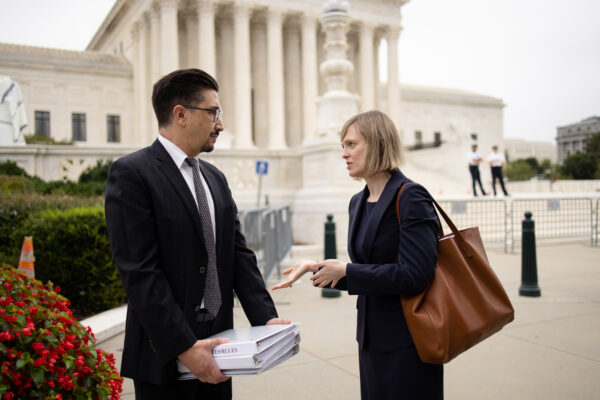In 2018, the ACLU and the ACLU of Kentucky filed suit on behalf of Kentucky abortion providers to challenge a state law banning physicians from providing a safe and medically proven abortion method called dilation and evacuation, or “D&E.” If it were to take effect, this law would prevent many patients from being able to seek abortion care altogether. This law would harm patients' health and dignity.
2018 ACLU LAWSUIT:
We sued in federal court immediately after former Governor Matt Bevin signed House Bill 454 into law in 2018. Following a trial, the U.S. District Court for the Western District of Kentucky ruled the law unconstitutional and permanently blocked its enforcement.
The state appealed our victory to the Sixth Circuit for the United States Court of Appeals. In June 2020, the Sixth Circuit reaffirmed our District Court victory, preventing the law from taking effect. After our second victory, the state agreed to comply with the court's decision and did not appeal further.
THE QUESTION BEFORE THE SUPREME COURT:
Despite the state agreeing to comply with the court's decision following our victory in EMW v. Meier at the Sixth Circuit, Attorney General Cameron is attempting to intervene at the eleventh hour so he can revive this unconstitutional abortion ban. He knows the courts are growing more hostile to abortion care and will stop at nothing in his effort to force Kentuckians to remain pregnant against their will – even if it means relitigating old cases.
Our litigation challenging HB 454 started before the current attorney general was elected. The Office of the Attorney General agreed to comply with the court's decision when we won. Therefore, the Office of the Attorney General – no matter who personally holds the office – must comply with the court’s decision.
However, Daniel Cameron is attempting to break his own office’s agreement so he can intervene in EMW v. Meier after sitting on the sidelines. He first requested permission at the Sixth Circuit and was denied by a panel of judges. Cameron then appealed to the Supreme Court, which decided to consider his request and will hear oral arguments Tuesday, October 12. (His request to intervene in EMW v. Meier is a separate case named Cameron v. EMW Women's Surgical Center.)
The question before the court is very technical in nature and will not address the merits of our challenge to HB 454 or the constitutionality of HB 454. The court is only considering whether Daniel Cameron can jump in at the last minute in an effort to revive EMW v. Meier so he can appeal our victory and attempt to reinstate HB 454.
If the Supreme Court disagrees with the Sixth Circuit’s decision, Cameron’s request to intervene would likely be sent back to the Sixth Circuit for reconsideration. If Cameron is allowed to intervene, he could revive this once-settled case and make the future of reproductive freedom even more uncertain.
National ACLU Reproductive Freedom Project Senior Staff Attorney Alexa Kolbi-Molinas will argue in person before the Supreme Court in Cameron v. EMW Women's Surgical Center. Listen to the arguments live at 10AM ET, Tuesday, October 12.
HOUSE BILL 454:
For many patients, the procedure banned by HB 454 is the safest and most appropriate. The law would force doctors to stop providing it and force patients either to leave the state for abortion care or to forego care altogether. A new study by the National Academies of Sciences, Engineering, and Medicine found these types of restrictions on abortion care create barriers to safe care.
Laws like HB 454 are not about patient safety or improving health outcomes. They are simply part of a broad strategy to push abortion care entirely out of reach, bit by bit. Between 2011 and 2019, state politicians passed over 483 new restrictions on abortion care that force patients to delay care, shut down clinics, and make abortion care unaffordable. Due in part to these restrictions, Kentucky is one of a handful of states where abortion care is offered at only two clinics in only one city – Louisville – and only one of the clinics can provide care in the second trimester.
Abortion care remains legal and you can still access abortion care in Kentucky.
The plaintiffs in Cameron v. EMW Women's Surgical Center are EMW Women’s Surgical Center, P.S.C., on behalf of itself, its staff, and its patients. They are represented by attorneys with the ACLU and the ACLU of Kentucky. See case documents and press releases here.
The plaintiffs in the underlying case, EMW Women's Surgical Center, P.S.C. v. Meier, are EMW Women’s Surgical Center, P.S.C., on behalf of itself, its staff, and its patients, as well as two physicians who provide care at EMW, on behalf of themselves and their patients. They are represented by attorneys with the ACLU and the ACLU of Kentucky. See case documents and press releases here.



